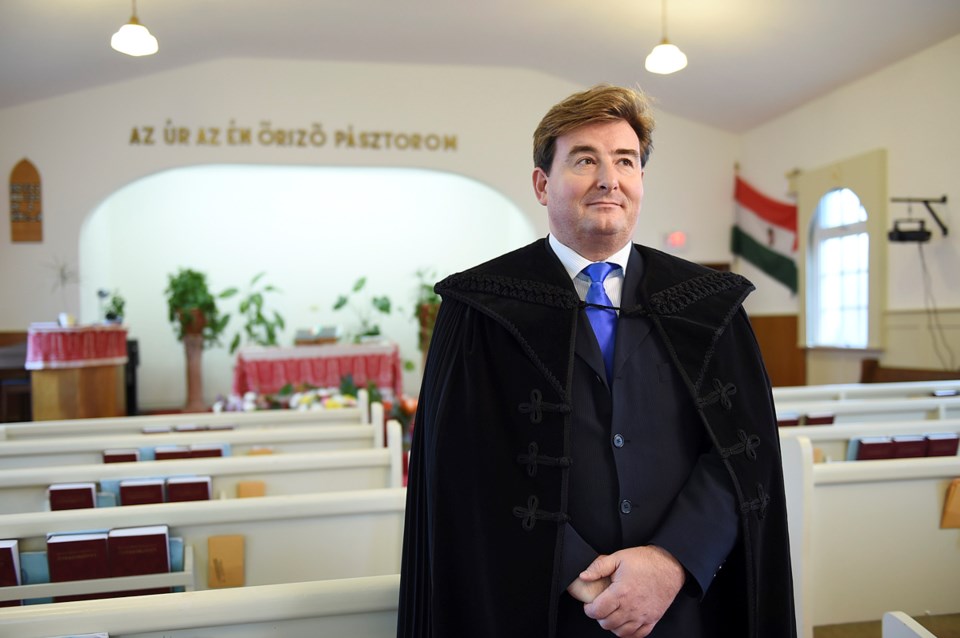The Hungarian Revolution of 1956 was the first significant uprising among any of the countries the Soviet Union had turned into satellite states after the Second World War. The revolt against Soviet domination was initially successful. The Moscow-backed government fell, the new regime announced Hungaryâs withdrawal from the Warsaw Pact and the Soviets said they would negotiate the removal of Soviet forces from the country.
But the Soviets changed their minds. On Nov. 4, the Soviet military moved to crush the liberalization and a battle raged for most of a week, leading to the deaths of 2,500 Hungarians and about 700 Soviet troops.
By January 1957, the Soviets had restored its iron fist not only in Hungary, but strengthened its hold across the entire eastern bloc as a preventative measure. During this time, about 200,000 Hungarians fled as refugees across the western border.
Three years earlier, Rev. Fred Metzger had come from Edmonton to Â鶹´«Ã½Ó³»to set up the cityâs first Hungarian-language church. It was a small enterprise â until events halfway around the world transformed the church and the Hungarian-Canadian community.
As Soviet tanks rolled into Budapest, Metzger connected with Canadian officials to come to the aid of the refugees, many of whom had taken temporary refuge in Vienna. The government provided a plane and 3,000 empty visas. Metzger flew to Vienna and began the airlift of thousands of Hungarians to B.C.
In all, Canada took in about 37,000 Hungarian refugees at the time. It was a massive influx into a comparatively small existing Hungarian-Canadian community.
Rev. Miklos Szigeti is the fifth and current minister at First Hungarian Presbyterian (Calvin) Church, the congregation founded nearly 70 years ago by Metzger.
âHis nickname was the Moses of Hungarians,â Szigeti says of his late predecessor.
The influx of Hungarians demanded that the congregation expand from its small church and it has moved again since then, now on East 27th, near Renfrew.
The membership has plateaued in recent years. There are still Hungarians coming to Vancouver, he says, but most of them have now been subjected to 50 years of communist brainwashing and, more recently, secularism.
âThey are not devoted as much to the Christian faith,â says Szigeti. And time marches on for those who came in 1956.
âThe â56 generation, they are leaving,â he says gently. âIt is their time to leave.â
The church remains a magnet for congregants from across the region. There never was much of a Hungarian neighbourhood in Vancouver, no âLittle Budapest,â and now real estate prices are forcing younger generations to the suburbs.
To keep the church vibrant, Szigeti considered offering English-language services, but that idea was rejected for two reasons. First, he and a few others had an epiphany when they went door-to-door in the neighbourhood and found that if he wanted to attract those folks to his church, he would have to start ministering in Cantonese or Mandarin, he says, not English.
Secondly, though, he got a lesson in the value of niche marketing when he told the church he might want to do services in English.
âThey said, listen Miklos, we are driving so much to come to a Hungarian worship because this is our mother tongue. If you want to preach in English, I can find a church close to my home that is way better than your English, so please do not do that because youâre going to lose the church.â
Instead, he is reaching out to young families through other methods. The small but steady flow of newcomers from Hungary in the past decade or two may not be particularly religious, but they do want their kids to get some Hungarian heritage.
âThey have a big desire that their children would be able to read and write Hungarian and they would like to share letters from grandma and grandpa,â he says.
So for an hour before services on Sundays, the church offers Hungarian language training. There are also cultural events such as a Christmas pageant the kids are beginning to practice for about now.
Szigetiâs is not the only Hungarian church in town, either. Hungaryâs history has led to a degree of religious pluralism unusual in Europe. Under the Ottoman occupation, he says, the Christians in Hungary turned from Rome toward the Reformist vision of Calvinism in the 1500s. When the Austrian Hapsburgs regained control, Roman Catholicism revived.
Most Hungarians who follow a faith are now Roman Catholic, and those in Â鶹´«Ã½Ó³»tend toward Our Lady of Hungary church near Commercial Drive. A Hungarian Reformed Church was created 20 years ago from congregants who broke away from First Hungarian Presbyterian.
The association with the Presbyterian church is also an interesting anomaly. When Metzger wanted to set up a church in Vancouver, he was aided by the Presbyterians, who allow ethnic churches like this one to maintain membership in the larger national body even while preserving freedom over their own traditions.
âWe have our own hymnbook, our liturgy, everything, we can keep it,â Szigeti says.
[email protected]
@Pat604Johnson



